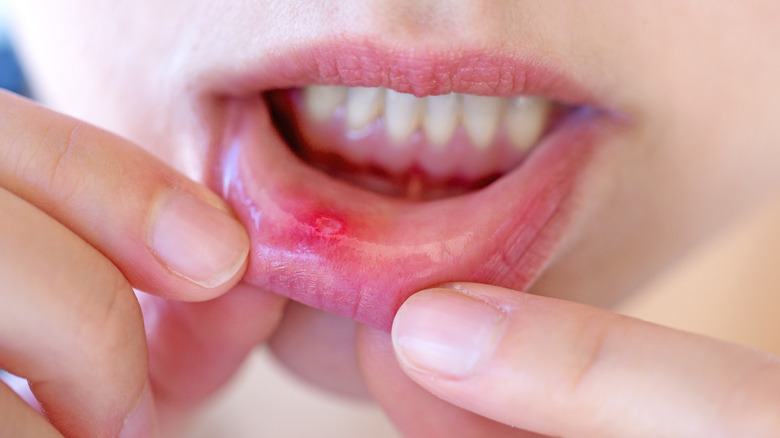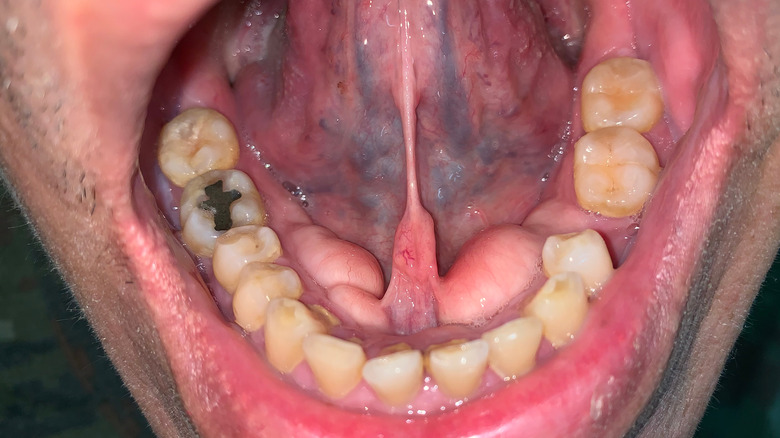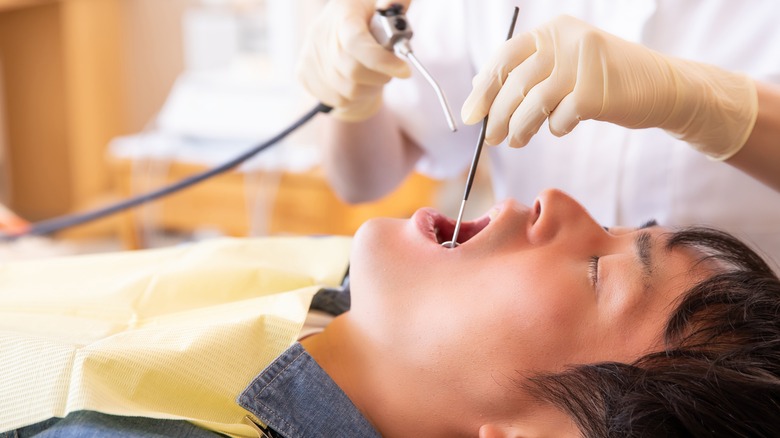11 Signs Of Oral Cancer You Should Never Ignore
Oral cancer refers to cancer found in the mouth or throat. According to the American Cancer Society, there are two broad groups of oral cancer: oral cavity cancer and oropharyngeal cancer. Oral cavity cancer affects the lips, cheeks, teeth, gums, the front two-thirds of the tongue, the floor of the mouth, the hard palate (the bony roof of the mouth), and the area behind the wisdom teeth. Meanwhile, oropharyngeal cancer includes the back one-third of the tongue, the soft palate (the soft tissue in the back of the roof of the mouth), the tonsils, and the side and back of the throat.
Squamous cell carcinomas, a.k.a. squamous cell cancers, are the most common type of oral cancer. Squamous cells are scale-like cells that line the mouth and throat. Early stages of squamous cell cancers affect only the top layer of cells, but later stages, known as invasive squamous cell carcinomas, grow deep into the oral cavity or oropharynx. Less common cancers include cancers of the salivary glands, lymphatic tissues like the tonsils or base of the tongue, and cancers related to human papilloma virus (HPV).
According to the National Institute of Dental and Craniofacial Research, the five-year survival rate for oral cancer is 60%, and early detection improves survival rates. Get to know your mouth and report any changes or unusual symptoms to your doctor or dentist.
Sores that won't heal
It's normal to develop sores in your mouth, so no need to worry if you bite your cheek or develop a canker sore. Run-of-the-mill sores should heal within two to three weeks, however, so take note of any sores that last longer than that (per the Mayo Clinic).
If you develop a sore in your mouth, use a mirror to look at it. Canker sores have a round or oval shape with a red border and a white or yellow center. They may cause pain or a burning or stinging sensation, even before they appear. Canker sores can appear anywhere in the oral cavity, including on or under the tongue, on the inner cheeks, inside the lips, and on the soft palate.
According to Healthline, oral cancer sores are usually painless, and they linger for more than a few weeks. Like canker sores, they can appear anywhere in the oral cavity. If you notice a sore that does not hurt and lasts for more than a few weeks, have a doctor examine it.
Red- or white-colored patches in your mouth
Other than the occasional canker sore, your oral cavity should be fairly smooth and consistently pink. If you notice any raised or flat patches that are white, grey, or red, take note. These may be pre-cancerous patches that can develop into oral cancer.
According to the Cleveland Clinic, there are three types of precancerous patches that precede oral cancer: leukoplakia, erythroplakia, and erythroleukoplakia. Leukoplakia appears as flat white or grey patches, erythroplakia appears as raised or flat red patches, and erythroleukoplakia appears as patches that are mixed red and white. You will not be able to scrape these patches off, and they may bleed if you try.
There are other conditions that can cause similar symptoms, so you should have any unusual patches checked out by a doctor. For example, thrush is a common fungal infection that causes white patches on the tongue and cheeks, though it can extend throughout the oral cavity (per the Mayo Clinic). You should be able to scrape off the white growth caused by thrush, though this may cause bleeding.
Unexplained lumps in your mouth or throat
Oral cancer causes tumors to develop, and these tumors may present as lumps in any part of your oral cavity, the back of your throat, or even in your throat.
According to information from the MD Anderson Cancer Center at the University of Texas, these lumps may vary in appearance depending on where they are found. You will probably be able to see lumps on the tongue, lips, cheeks, or gums. They should feel like a bump. Chances are that you will not be able to see any lumps in your throat, especially if they are deep. Tumors deep in the mouth or throat may make it difficult to swallow, or you might feel like you have something stuck in your throat. None of these tumors should feel painful.
Oral cancer is not the only source of lumps and bumps in the oral cavity and throat, though. Warts and yeast infections can also cause lumps, as can repeated trauma (per the Merck Manual). For example, if you chew on the inside of your cheek as a habit, a lump may develop in response. Not all bumps are cancerous, but you should have any lumps or bumps checked by a doctor anyway.
Pain that does not resolve on its own
Of course, you expect a canker sore to hurt, and it should come as no surprise if you feel pain after burning the roof of your mouth with a hot slice of pizza. But new pain that seems unrelated to a recent injury is cause for concern, especially if that pain does not go away.
For some patients, unexplained pain is the first symptom of oral cancer. One 2006 study published in the journal Oral Surgery, Oral Medicine, Oral Pathology, and Oral Radiology and Endodontics evaluated the medical records of close to 1,500 patients with oral cancer. Just under 20% of these patients described pain as their first symptom, with a sore throat, mouth pain, and tongue pain as the top three complaints. Similarly, a 2022 study from the same journal followed a group of cancer patients and found that for more than half of them, pain was the initial reason that they sought treatment. In this group, some of the most common complaints were pain when chewing or swallowing and earache.
A variety of factors can cause these symptoms, so just because you are experiencing new pain does not mean that you have oral cancer. Viral infections, strep throat, allergies, and smoking can cause a sore throat (per the Centers for Disease Control). Meanwhile, injury, infection, and anemia can all cause tongue pain (per Healthline). But if you develop new and unexplained pain that lingers, see a doctor to find the source.
Difficulty chewing, swallowing, or moving your tongue or jaw
Oral cancer can interfere with your ability to chew, swallow, or speak. Take notice of any new difficulties in these areas, as they may indicate the presence of an oral cancer tumor. Large oral cancer tumors can affect the movement of your tongue (per the MD Anderson Cancer Center), which can make it hard to effectively move food around in your mouth to chew and swallow it. According to the American Cancer Society, oral cancer can also cause pain and swelling in the jaw and may make moving the jaw difficult. These symptoms also contribute to difficulty chewing and speaking.
Large tumors may also make it hard to swallow. According to the MD Anderson Cancer Center, some oral cancer tumors block the throat, making it hard for food to pass through. Difficulty swallowing is clinically known as dysphagia and can have many causes (per the Mayo Clinic). Muscle spasms, scar tissue from gastroesophageal reflux disease (GERD), and neurological disorders are just a few other conditions that can lead to dysphagia. Consult a doctor to get to the source of your problems with swallowing.
A swollen or painful jaw
While rare, a swollen or painful jaw may indicate oral cancer. A 2004 case report from the Journal of the Canadian Chiropractic Association describes a female patient who sought treatment for pain in the left jaw that was radiating to the left ear. While she thought the pain was caused by a broken tooth or arthritis, further examination revealed an ulcerated mass near the base of her tongue on the left. A biopsy revealed that the mass was cancerous.
Many other conditions, such as dental problems, vascular problems, and bone infections, can also lead to pain in the jaw (per Medical News Today). Temporomandibular joint (TMJ) disorders are the source of most people's jaw pain, according to the Mayo Clinic. This joint connects your jaw to your skull, and a genetic predisposition, arthritis, or habits such as clenching or grinding your teeth can lead to TBJ disorders. People with TMJ disorders may experience pain or tenderness on one or both sides of the jaw or the joint, earache, facial pain, and difficulty chewing. Many of these symptoms overlap with the symptoms of oral cancer.
If you have a swollen or painful jaw, seek treatment promptly. It is important that you see a doctor about your jaw pain so that you can learn why you are hurting and what you can do about it.
Numb lips, mouth, or tongue
While oral cancer can cause pain in the tongue, ears, jaw, and throat, it can also cause the opposite of pain: numbness. According to the American Cancer Society, oral cancer can cause numbness in the chin, lips, and other areas of the mouth. These symptoms can be referred to as numb chin syndrome or numb lip syndrome (per a 2009 case report published in the Journal of Cancer Research and Therapeutics).
According to this 2009 report, numb chin syndrome occurs when a cancerous growth compresses the nerve supplying the chin, lips, and mouth. It can also occur when a patient develops paraneoplastic syndrome, an immune response to cancer that attacks the patient's own nervous system (per the National Institute of Neurological Disorders and Stroke). Other causes include perineural invasion and leptomeningeal seeding, in which cancer cells migrate to the cerebrospinal fluid and start to grow in the brain or spinal cord (per the Mount Sinai Hospital).
According to a 2013 review published in the Italian journal Annali di Stomatologia, patients with numb chin syndrome may experience numbness, hypoesthesia (loss of sensation in the chin), paraesthesia (tingling or prickling sensation in the chin), and more rarely, pain. Dental problems are the most common cause of numb chin syndrome, but if there is no dental explanation, doctors will look for tumors, trauma, or systemic diseases.
Dental problems
Problems with your teeth probably indicate a more routine problem like a cavity, but they can also indicate oral cancer. According to Healthline, early oral cancer may present as a toothache or suspected cavity. Loose teeth are another sign of oral cancer (per the Mayo Clinic). If you develop a new loose tooth, a toothache that will not go away, or other changes in your dental health, take the time to have it checked out by your dentist or doctor.
Chronic mechanical irritation, which simply means chronic rubbing or abrasion, in the oral cavity can trigger the development of oral cancer (per a 2020 review in the International Journal of Molecular Sciences). Some common sources of this irritation are a broken tooth, poorly fitting dentures, defective restorations, or even just habitual biting or chewing of the cheeks. Chronic irritation leads to chronic inflammation, which can cause changes in the cells that turn them cancerous.
According to a 2014 study published in the journal Oral Oncology, denture use alone is associated with oral cancer, and ill-fitting dentures substantially increase the risk of oral cancer. If you wear dentures or have other risk factors that can cause chronic irritation, you should see your dentist for regular checkups that look for oral cancer signs as well as cavities and other dental problems.
Changes in your voice or speech
It makes sense that oral cancer can cause changes in your voice or speech. After all, you use your whole mouth to talk. Whether and how oral cancer affects the voice and speech patterns depends on where the cancer develops.
According to the American Cancer Society, oral cancer that affects the vocal cords can cause vocal changes. Cancers that start on the vocal cords or start elsewhere but spread to the vocal cords can cause hoarseness. A variety of other conditions can make your hoarse (per the Cleveland Clinic). For example, a cold or sinus infection, laryngitis, and overuse of your voice from talking or cheering can all make you hoarse. These conditions should heal on their own in about two weeks. If you become hoarse and do not improve after two weeks, make an appointment with your doctor.
Per a 2016 study published in the Indian Journal of Palliative Care, oral cancer patients are prone to speech difficulties. Proper speech depends on flexibility in the mouth and throat as well as control of the lips, tongue, and soft palate. Oral cancer tumors may interfere with movement and control of these areas, causing changes in speech. This study evaluated 24 patients who had either buccal (cheek) or tongue cancer and found that patients with tongue cancer frequently distorted the sounds for the letters "r" and "t." If you begin to have trouble articulating sounds or develop other new speech problems, seek prompt medical attention.
Unexplained weight loss
You may be pleasantly surprised if you start losing weight without even trying, but unexplained weight loss can be a symptom of cancer. If you have not recently changed your eating habits or your exercise routine but have started shedding pounds, check in with your doctor to see what's going on.
Oral cancer, as well as other cancers such as stomach, lung, pancreatic, and esophageal cancer, often cause weight loss, according to Healthline. Because they can make you feel nauseous, reduce your appetite, or make chewing painful, you may not feel like eating. In addition, cancer can cause inflammation throughout your body, changing your metabolism and causing your body to burn muscle and fat, which will make you lose weight. Tumors also burn a lot of energy as they grow, almost like having a little engine inside of you. Tumors can burn through so many calories that they cause you to lose weight.
Cancer is not the only explanation for unexplained weight loss, though. According to Medical News Today, medical conditions such as Addison's disease, hyperthyroidism, inflammatory bowel disease, and rheumatoid arthritis can all cause you to lose weight, as can stress and depression. These conditions require treatment, so make an appointment with your doctor to get to the route of your unexpected weight loss.
Ear pain
Ear pain may indicate not just the presence of oral cancer, but also that the cancer has spread beyond the oral cavity. A 2020 study published in the Journal of Oral and Maxillofacial Surgery evaluated 128 patients with a type of oral cancer known as squamous cell carcinoma of the tongue. Just under 40% of the patients experienced otalgia (ear pain). These patients had greater odds of perineural invasion (PNI) than patients without ear pain.
According to a 2009 review published in the journal Cancer, PNI is a process through which cancer spreads by growing through the nerves. Head and neck cancers, including oral cancers, are known to spread through PNI. It can be a marker of poor health outcomes and decreased survivability.
With that said, not every earache means oral cancer has spread through your nerves. Ear infections, ruptured eardrums, and even dental problems can cause earaches (per the Cleveland Clinic). Still, you should have a doctor check your ears if you develop an earache so that you can get the right treatment for whatever condition is causing you pain.
Oral cancer diagnosis and treatment
If you develop any symptoms of oral cancer, you should seek medical advice. When you go to the doctor, he or she will start by physically examining your mouth (per the Mayo Clinic). Your doctor will look for lumps, bumps, ulcers, swelling, colored patches, and any other physical symptoms of oral cancer. In addition, they may take a biopsy of any potentially cancerous sites and send the sample to a lab for analysis.
Your doctor may also recommend diagnostic imaging such as an endoscopy, X-ray, MRI, CT scan, or PET scan. These images will help the doctor determine whether oral cancer has spread to other areas of the body. They will also help the doctor determine the stage of your cancer.
There are several treatment options available for oral cancer, including surgery to remove any tumors in the oral cavity as well as any cancer that has spread. Removing the tumor may damage your cheeks, lips, tongue, jaw, and teeth, so you may also need reconstructive surgery. Your doctor may recommend radiation, chemotherapy, immunotherapy, or targeted drug therapy after surgery.













